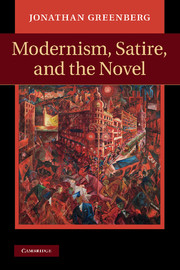Book contents
- Frontmatter
- Contents
- Illustration
- Preface
- Abbreviations
- Chapter 1 Satire and its discontents
- Chapter 2 Modernism's story of feeling
- Chapter 3 The rule of outrage: Evelyn Waugh's Vile Bodies
- Chapter 4 Laughter and fear in A Handful of Dust
- Chapter 5 Cold Comfort Farm and mental life
- Chapter 6 Nathanael West and the mystery of feeling
- Chapter 7 Nightwood and the ends of satire
- Chapter 8 Beckett's authoritarian personalities
- Notes
- Index
Chapter 1 - Satire and its discontents
Published online by Cambridge University Press: 07 October 2011
- Frontmatter
- Contents
- Illustration
- Preface
- Abbreviations
- Chapter 1 Satire and its discontents
- Chapter 2 Modernism's story of feeling
- Chapter 3 The rule of outrage: Evelyn Waugh's Vile Bodies
- Chapter 4 Laughter and fear in A Handful of Dust
- Chapter 5 Cold Comfort Farm and mental life
- Chapter 6 Nathanael West and the mystery of feeling
- Chapter 7 Nightwood and the ends of satire
- Chapter 8 Beckett's authoritarian personalities
- Notes
- Index
Summary
Modernism changed the way we know and feel. Modernist literary works, and the intellectual and cultural currents from which they drew force, not only chronicled but also fostered changes in what Raymond Williams has called “structures of feeling.” Williams, recall, introduces this concept in an attempt to capture the inchoateness and complexity of an experience that is shared or social, even though it may be still emergent and therefore misrecognized as “private, idiosyncratic, and even isolating.” Just as “no generation speaks quite the same language as its predecessors,” just as “manners, dress, building and other forms of social life” evolve gradually over time, so, Williams posits, an ever-changing but pervasive “set” of interlocking affective dispositions exists across a culture, forming a complex “structure” that can be discerned in “characteristic elements of impulse, restraint, and tone.” Like most talk of feeling, this is pretty fuzzy, but it furnishes a theoretical starting-point from which history can attend to the felt quality of experience and from which feelings, which common sense might take to be unchanging and universal, can be historicized.
As students of affect theory are aware, exactly such a historicization of feeling has recently been taken up by scholars in literary studies, who have argued that because modernity constitutes a new and in many ways unique social formation it cannot help but impinge on the ways that life is lived and feelings are felt. Sianne Ngai contends that a new set of minor, noncathartic, “ugly” feelings are characteristic of life under mature capitalism: “the nature of the sociopolitical itself has changed in a manner that both calls forth and calls upon a new set of feelings – one less powerful than the classical political passions.” Elizabeth Goodstein looks at boredom as an affect peculiar to the last century and half, when a modernity born out of processes such as “secularization, rationalization, and democratization” produced “experiential transformations” that “literally altered the quality of human being in time.” And Justus Nieland, examining modernism's representation of public performance, argues that feeling within modernism was reconfigured by seismic shifts in the character of an always mediated public sphere, shifts to which human beings as individuals and as collectivities were required, often abruptly, to adapt. Without disavowing all continuity of human experience over time, then, we might recognize that during the era of modernism people were experiencing – were feeling – their world in new ways. As Ezra Pound put it in 1913: “if we still feel the same emotions as those which launched the thousand ships, it is quite certain that we come on these feelings differently, through different nuances, by different intellectual gradations.”
- Type
- Chapter
- Information
- Modernism, Satire and the Novel , pp. 1 - 20Publisher: Cambridge University PressPrint publication year: 2011



